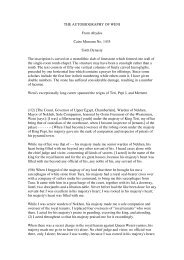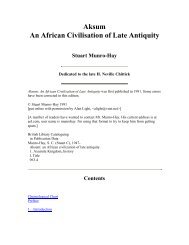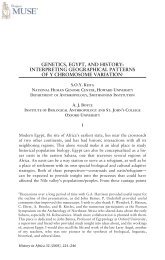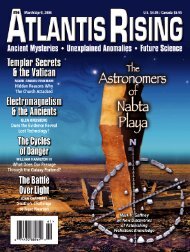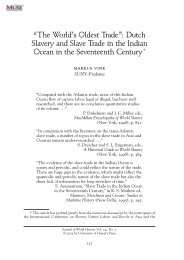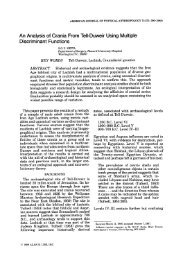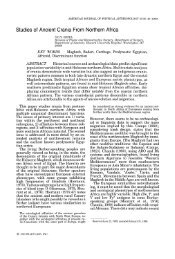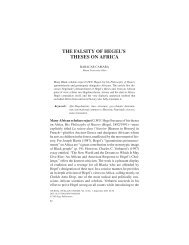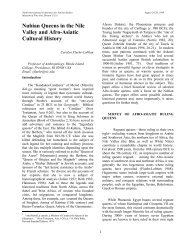The Negro trail blazers of California [microform] : a ... - Homestead
The Negro trail blazers of California [microform] : a ... - Homestead
The Negro trail blazers of California [microform] : a ... - Homestead
You also want an ePaper? Increase the reach of your titles
YUMPU automatically turns print PDFs into web optimized ePapers that Google loves.
CHAPTER VI<br />
Admission <strong>of</strong> <strong>California</strong> into the Union<br />
In Bancr<strong>of</strong>t's political history the following appears: "Early in 1848 the editor <strong>of</strong><br />
the <strong>California</strong>n in May <strong>of</strong> that year declared that he echoed the sentiment <strong>of</strong> the people<br />
<strong>of</strong> <strong>California</strong> in saying that slavery is not desired here and if their voices could be heard<br />
in the halls <strong>of</strong> our National Legislature, "it would be as one man, rather than place this<br />
blighting curse upon us. Let us remain as we are, unacknowledged and unaided."<br />
<strong>The</strong> slavery question was so prominent that <strong>California</strong> never passed through a Territorial<br />
form <strong>of</strong> government. <strong>The</strong> citizens held a convention, formed their constitution and<br />
elected a Legislature without the permission <strong>of</strong> the Congress <strong>of</strong> the United States <strong>The</strong>ir<br />
object was to be admitted to the Union <strong>of</strong> the United States Government as a Free State,<br />
before the slaveholders could locate their slaves in <strong>California</strong>.<br />
<strong>The</strong>re was no transcontinental railroads in pioneer days coming into <strong>California</strong>. <strong>The</strong><br />
trip was dangerous, long and at the best it was not an easy matter to communicate with<br />
the government in Washington or locate in <strong>California</strong>. <strong>The</strong> majority <strong>of</strong> the citizens <strong>of</strong><br />
the State at that date were people from the South and yet they were bitterly opposed to<br />
the slave traffic in <strong>California</strong>. <strong>The</strong>ir position is better explained with, a quotation from<br />
"General U. S. Grant's Memories" (p. 39): "<strong>The</strong> labor <strong>of</strong> the country was not skilled,<br />
nor allowed to become so. <strong>The</strong> whites could not toil without becoming degraded and those<br />
who did were denominated 'poor white trash.' <strong>The</strong> system <strong>of</strong> labor would have soon<br />
exhausted the soil, and the non-slaveholder would have left the country and the small<br />
slaveholder must have sold out to his more fortunate neighbor."<br />
This quotation fully explains to the reader that the majority <strong>of</strong> the white settlers at<br />
that period in <strong>California</strong> belonged to either the northern element who were opposed to<br />
slavery from principle, or they were opposed to it because they were too poor to own<br />
slaves, while the other half <strong>of</strong> the white settlers in the Territory <strong>of</strong> <strong>California</strong> were for<br />
bringing their slaves because they saw a possibility <strong>of</strong> working the mines and reaping a<br />
fortune through slave labor.<br />
<strong>The</strong> opposition to slave labor in <strong>California</strong> by those who did not own slaves in the<br />
Southland previous to coming west, was because <strong>of</strong> the terrible caste <strong>of</strong> being called "poor<br />
white trash" if they attempted to make their own living. <strong>The</strong>re was among the settlers<br />
in <strong>California</strong> during pioneer days good material for the making <strong>of</strong> good humanitarians.<br />
<strong>The</strong>y were sincere and believed, like Columbus, that <strong>California</strong>, with its balmy atmosphere<br />
and beauty, was too near the "Terrestrial Paradise" to blight it with human slavery.<br />
And to add an insult to their efforts to make their living by the sweat <strong>of</strong> their own brow,<br />
or be called for so doing ' ' poor white trash. ' ' <strong>The</strong> caste in a place as beautiful and rich<br />
with gold as <strong>California</strong> would have been thrice as hard as in the other parts <strong>of</strong> the United<br />
States.<br />
If the <strong>Negro</strong> slaveholders could bring their slaves to work the mines they would soon<br />
have all the gold and the poor white people would be poorer than ever. <strong>The</strong>y realized that<br />
no country can continue long beautiful that has for its object the oppression <strong>of</strong> mankind,<br />
whether black, red, yellow or white. <strong>The</strong> course these early <strong>California</strong>ns took at that early<br />
date in <strong>California</strong>'s history is the same today. <strong>The</strong>y may some time make mistakes, but<br />
they are not afraid to do the right thing as it appears to them, whether anyone else approves<br />
or not.<br />
Long before the United States Congress met again <strong>California</strong> had formed its constitution,<br />
held one session <strong>of</strong> the Legislature and sent a representative to the United States<br />
Congress to ask admission into the Union, which was the beginning <strong>of</strong> the greatest chapter<br />
in American History. Congress, owing to the slave question, had been unable to agree on<br />
a Territorial form <strong>of</strong> government for <strong>California</strong>. <strong>The</strong>re were some very eloquent addresses<br />
delivered for and against its admission. Both sides presenting arguments in defense <strong>of</strong><br />
their views and rights. A few years previous the House passed the Missouri Compromise<br />
which was intended to limit the extension <strong>of</strong> slavery. It was afterward amended so that<br />
two States, Nebraska and Kansas, were admitted into the Union and without restricting<br />
slavery. Afterward the "Wilmot Proviso" was passed by Congress, which said that "No<br />
part <strong>of</strong> the territory acquired from Mexico shall be open to the introduction <strong>of</strong> slavery."<br />
<strong>The</strong> southern members <strong>of</strong> Congress deemed it just that the newly acquired Territory<br />
<strong>of</strong> <strong>California</strong> should either admit slavery in all or part. <strong>The</strong>re were at the time fifteen<br />
Free States and fifteen Slave States in the United States. Some <strong>of</strong> the members <strong>of</strong> the<br />
<strong>California</strong> Constitutional Convention who were friendly to the South had tried to have


![The Negro trail blazers of California [microform] : a ... - Homestead](https://img.yumpu.com/32436613/47/500x640/the-negro-trail-blazers-of-california-microform-a-homestead.jpg)

